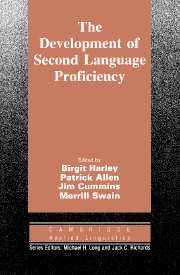Book contents
- Frontmatter
- Contents
- List of contributors
- Series editors' preface
- Acknowledgments
- Introduction
- I THE NATURE OF LANGUAGE PROFICIENCY
- II CLASSROOM TREATMENT
- Chapter 5 Aspects of classroom treatment: toward a more comprehensive view of second language education
- Chapter 6 Process-product research on second language learning in classrooms
- Chapter 7 Analysis and experience as variables in second language pedagogy
- Chapter 8 Response by DBP project members to the discussion papers of Patsy Lightbown and H.H. (David) Stern
- III SOCIAL AND INDIVIDUAL VARIABLES
- IV PRACTICAL AND POLICY IMPLICATIONS
- V THIRTY-FIVE YEARS OF RESEARCH ON BILINGUALISM
- CONCLUSION
- References
- Author Index
- Subject Index
Chapter 7 - Analysis and experience as variables in second language pedagogy
Published online by Cambridge University Press: 05 October 2012
- Frontmatter
- Contents
- List of contributors
- Series editors' preface
- Acknowledgments
- Introduction
- I THE NATURE OF LANGUAGE PROFICIENCY
- II CLASSROOM TREATMENT
- Chapter 5 Aspects of classroom treatment: toward a more comprehensive view of second language education
- Chapter 6 Process-product research on second language learning in classrooms
- Chapter 7 Analysis and experience as variables in second language pedagogy
- Chapter 8 Response by DBP project members to the discussion papers of Patsy Lightbown and H.H. (David) Stern
- III SOCIAL AND INDIVIDUAL VARIABLES
- IV PRACTICAL AND POLICY IMPLICATIONS
- V THIRTY-FIVE YEARS OF RESEARCH ON BILINGUALISM
- CONCLUSION
- References
- Author Index
- Subject Index
Summary
The two concepts in the title of this discussion paper, experience and analysis, present in my view the common theme of the treatment studies in the DBP project (see Chapter 5). The central problems are: Which of these two concepts is more important for proficiency development? How should they manifest themselves? What is the most effective relationship between them? The DBP researchers discuss these issues and conclude:
The analytic focus and the experiential focus may be complementary, and… they may provide essential support for one another in the L2 classroom. (Chapter 5:77)
The COLT studies (Allen, Fröhlich, and Spada 1987; Allen, Carroll, Burtis, and Gaudino 1987) deal directly with the relationship between analytic and experiential activities. The two immersion studies (Harley 1989b; Swain and Carroll 1987) also deal with this issue, but perhaps more indirectly. They seem to be based on the assumption that immersion is largely experiential anyway, and that it is now timely to pay more attention to vocabulary, grammar errors, and other aspects of the immersion student's proficiency development. The broader issues of content teaching and language teaching in immersion programs are discussed in more general terms in Harley (1989b) and Swain (1988). The immersion experimental study questions Krashen's theoretical position that we should avoid grammar teaching of any kind, and deliberately experiments with analytic materials which “are attuned as closely as possible to the primarily experiential focus of an immersion program” (Harley 1989b).
- Type
- Chapter
- Information
- The Development of Second Language Proficiency , pp. 93 - 109Publisher: Cambridge University PressPrint publication year: 1990
- 22
- Cited by



